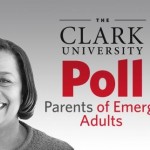
Forget those TV ads where parents gleefully anticipate “alone time” as they wave goodbye to their college-bound children. For most parents of emerging adults, back-to-school time means missing their best friends.
The 2013 Clark University Poll of Parents of Emerging Adults finds that parents and their emerging adults get along well, much better than they did when the children were in adolescence. Most parents (73%) describe their current relationship with their grown kid as “mostly positive,” while only 2% describe their relationship as “mostly negative.” In fact, parents enjoy their relationship with their grown child more than anything else in their lives, including leisure activities, watching TV and travel—even more than their relationship with their spouse or partner.
Jeffrey Jensen Arnett discusses parents’ relationships with their adult children.
Most parents see their relationship with their emerging adult as having improved greatly in recent years. Two-thirds (66%) of parents agree that they get along better with their 18- to 29-year-old now than when the child was in his or her mid-teens. This is not just the parents’ view: In the 2012 national survey of 18- to 29-year-olds, the Clark University Poll of Emerging Adults, 75% agreed that they get along a lot better with their parents now than they did in their mid-teens.
“Adolescence can be a tough time between parents and kids, but relations almost always improve from adolescence to emerging adulthood,” observes Jeffrey Jensen Arnett, the Clark University Research Professor of Psychology who directed the poll. “It becomes more like a friendship than a strict hierarchy between parent and child.”
Other poll findings:
Which of the following are current sources of ENJOYMENT for you?
(% of parents surveyed)
86% — Relationship with my 18-29 year-old children
84% — Hobbies or leisure activities
82% — Watching television
79% — Travel or holidays
75% — Relationship with spouse or partner
Which of the following changes have taken place in your relationship with your child since he/she was 15 years old?
86% — We have more adult conversations.
78% — We enjoy our time together more.
71% — He/she is more respectful toward me.
55% — We have become more like friends.
49% — He/she sees me more as a person rather than a parent.
20% — We are not as close.
16% — We have more conflict now.
Parents’ reports of positive changes grow more pronounced in the course of the emerging adult years. Three fourths (74%) of parents of an 18- to 21-year-olds name “we enjoy our time together more” as a change that has taken place since the child was age 15, but this rises to 83% for parents of 26- to 29-year-olds. Sixty-four percent of parents with an emerging adult between the ages of 26 and 29 say they have become more like friends now than at age 15, as compared to 49% of parents of 18- to 21-year-olds. Parents of 26- to 29-year-olds are also more likely to believe that their child “sees me more as a person rather than a parent” (55%) compared to parents of younger emerging adults (43%).
The 2013 Clark University Poll of Parents of Emerging Adults and the 2012 Clark University Poll of Emerging Adults were developed by Arnett, who coined the term “emerging adulthood.” He recently co-authored (with Elisabeth Fishel) “When Will My Grown-Up Kid Grow Up: Loving and Understanding Your Emerging Adult” (Workman; May 2013). The book offers insights into how parents and their emerging adult children can navigate this stage in their relationship/development.
Founded in 1887 in Worcester, MA, Clark University is a small, liberal arts-based research university addressing social and human imperatives on a global scale.
